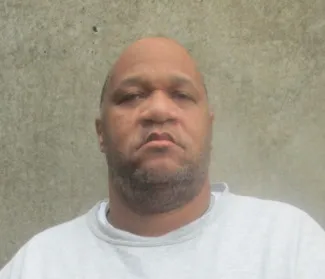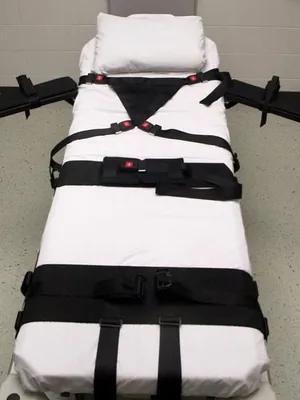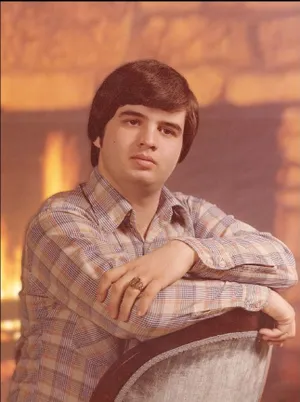Emmanuel Littlejohn executed in Oklahoma despite clemency recommendation from state board
Emmanuel Littlejohn was executed by the state of Oklahoma Thursday morning in the shooting death of a beloved convenience store owner, despite a recommendation from a clemency board that his life should be spared.
Littlejohn was convicted of the 1992 murder of Kenneth Meers in a robbery that turned fatal. Littlejohn had admitted to his role in the robbery but insisted until his death that an accomplice was the one to pull the trigger.
Littlejohn's execution was the fourth in the U.S. in less than a week and comes just hours before Alabama is set to use nitrogen gas to execute Alan Eugene Miller on Thursday evening.
Littlejohn pleaded for his life to Republican Gov. Kevin Stitt after he was recommended for clemency by the state's Pardons and Parole Board in August, a fleeting victory for the clemency campaign waged in his name.
"A jury found (Littlejohn) guilty and sentenced him to death. The decision was upheld by multiple judges," Stitt said in a statement released after the execution. "As a law and order governor, I have a hard time unilaterally overturning that decision."
Littlejohn shared his message for Stitt with USA TODAY in an interview before his death: "I would say to the governor: Do what you think is the right thing."
Littlejohn reiterated his plea to the Meers family during his statement in the clemency hearing.
"Hear me now, I'm sorry," Littlejohn said. "Oklahoma, nor the Meers family, will be better by killing me."

How as Emmanuel Littlejohn executed?
The state administered a three-drug protocol of midazolam, vecuronium bromide and potassium chloride to complete the execution. Littlejohn was declared dead by at 10:17 a.m., according to Oklahoma Department of Corrections officials.
Rev. Jeff Hood, Littlejohn's spiritual advisor and noted anti-death penalty activist, criticized the delay in the clemency decision, saying that the lack of clarity ahead of the execution was "cruel."
"Kevin Stitt is a coward. Only a coward would wait until the very last-minute holed up in the governor's mansion where he doesn't have to face any consequences for making a decision," Hood said in an interview with USA TODAY after the execution. "You've got hundreds of people who were forced to come down to McAllister today not knowing what's about to happen, not knowing if somebody's going to get executed or not executed. Imagine if you're the Meers family and you don't know whether you're coming to an execution or not, imagine being (Littlejohn's mother.)"
The criticism was echoed by anti-death penalty activists who were gathered outside the governor's mansion in Oklahoma City.
"It's not lost on me that he had a heart procedure done last week where they put a stent in his heart, and you know, with one breath, he could have been gone," former Oklahoma State Senator Connie Johnson said in an interview with USA TODAY after the execution. "But somebody saved his life, and he had the same opportunity and very cavalierly dismissed it, as if this man's life didn't matter."
Hood, who was in the chamber, said that the execution took longer than expected and that Littlejohn's fists were clenched while the drugs were administered.
Littlejohn's last meal, final words
Littlejohn's final statement to those outside the chamber sought to comfort his mother and daughter who were witness to the execution, according to Hood and media witnesses.
Littlejohn told his mother he loved her and said, "I'm okay, everything is going to be okay," before telling his daughter the same.
After the microphones to the witness box were cut off Hood apologized to Littlejohn for not being able to stop the execution, after which Littlejohn said his final words.
"Jeff, the only reason we made it this far is because of you," Littlejohn said according to Hood.
During the execution Hood read bible verses and he noted that Littlejohn wanted the passage, "Let he among you who is without sin cast the first stone," from the book of John recited to address the state. The final passage Hood repeated during the execution came from Corinthians 13:13 which reads, "faith, hope and love remain, but the greatest of these is love."
"A lot of people say, go to the light. I kept telling him to go to the love, wherever love is. That's where he needs to go," Hood said.
Hood previously said that Littlejohn's final day included meetings with his mother and stepfather, as well as calls to his daughter and granddaughter.
"I've seen it repeatedly that it seems that those who are most courageous in these moments are perhaps the most human in these moments, are those who can walk right up till the moment of death and dare to be themselves," Hood said Tuesday.
His final meal consisted of a large meat lovers style pizza, two slices of cheesecake and Coca-Cola.
USA TODAY is working to confirm what Littlejohn's last words were on Thursday as he lie on the execution bed.

What was Emmanuel Littlejohn convicted of?
Littlejohn was one of two robbers who took money from the Root-N-Scoot convenience store in southern Oklahoma City on June 19, 1992. Littlejohn was 20 years old at the time.
Kenneth Meers, 31, was killed by a single shot to the face as he charged at the robbers with a broom.
Witnesses differed on who fired the gun. Clemency activists for Littlejohn point to witnesses that said the "taller man" was the shooter, referring to Meers' accomplice, Glenn Bethany. The state put forward court testimony from the survivors of the robbery who identified Littlejohn as the shooter.
Prosecutors argued at the clemency hearing that the shooting was the result of a debt owed by Littlejohn and Bethany, who were selling drugs at the time.
Littlejohn had recently been released from prison after pleading guilty and being convicted of burglary, assault and robbery, according to the state's anti-clemency packet.
The burglary plea resulted from an altercation after a car accident where Littlejohn admitted to stealing a car radio. The robbery and assault pleas stemmed from a robbery at a drug house.
Bethany was convicted of first-degree murder and sentenced to life in prison without the possibility of parole in 1993.
Littlejohn was convicted of first-degree murder and sentenced to death in 1994. A second jury in 2000 also voted for the death penalty at a resentencing trial. The Oklahoma Court of Criminal Appeals ordered the resentencing because of improper testimony from a jailhouse informant.
Who was Kenneth Meers?
Kenneth Meers was the youngest of six children and grew up in southeastern Oklahoma City. He loved music, his job, and skiing in Colorado, according to the state's anti-clemency packet.
Meers had worked at the Root-N-Scoot convenience store since he was 13 years old and later co-owned it with his brother, Bill Meers.
Bill Meers told the court during Littlejohn's trial that his brother had grown attached to that store and the community surrounding it. Their mother, Delores Meers, said in court that Kenneth would regularly support those who had fallen on hard times and even held a yearly Christmas gift raffle for area children.
The Meers family spoke in support of the state executing Littlejohn, describing Kenneth as a person who was community-minded and willing to help those in need.
"I believe my mom died of a broken heart," Bill Meers said during the clemency hearing. "I cannot and will not forgive this man for carelessly finding Kenny's life meant nothing."
"Justice has been served for the murder of Kenny Meers," Oklahoma Attorney General Getner Drummond (R) said in a statement released after the execution. "I pray that today brings some measure of peace to the Meers family who has waited 32 long years for justice to be served."

What has Littlejohn argued when pleading for clemency
Central to Littlejohn's appeal was a claim of prosecutorial misconduct. His attorneys complained the same prosecutor argued at the first trial that Bethany was the shooter and then argued at the subsequent trial that Littlejohn was the shooter.
"I believe Emmanuel wasn't the shooter but on a very basic level, before the parole board, you got ambiguity," Hood previously told USA TODAY in an interview. "I believe that the district attorney and the prosecutors created a situation where it should be impossible to execute someone because you aren't sure that the person that you're executing is the actual shooter."
During the clemency hearing, Littlejohn's attorneys said the inmate's childhood was influenced by his mother's addictions and violent surroundings. The lawyers presented a video where his mother admitted to using drugs throughout her pregnancy and during Littlejohn's childhood, becoming sober after her son was sentenced to death.

"At the time of the robbery of the Root-N-Scoot, (Littlejohn) 20-year-old brain was still developing in crucial areas and, given his disadvantaged childhood including frequent exposure to violence and drugs, his brain was already vulnerable and less developed than the typical 20-year-old’s," Littlejohn's attorneys wrote in their clemency packet.
Littlejohn's attorneys argued that he had used his time in prison to grow up and was now a positive role model for his daughter and grandchildren.
"I am deeply disappointed that Governor Stitt did not follow the recommendation of his hand-picked Pardon and Parole Board to grant clemency and stay the execution," Oklahoma State House Rep. Jason Lowe (D-Oklahoma City) said in a statement released after the execution. "
This story has been updated with new information
Disclaimer: The copyright of this article belongs to the original author. Reposting this article is solely for the purpose of information dissemination and does not constitute any investment advice. If there is any infringement, please contact us immediately. We will make corrections or deletions as necessary. Thank you.






